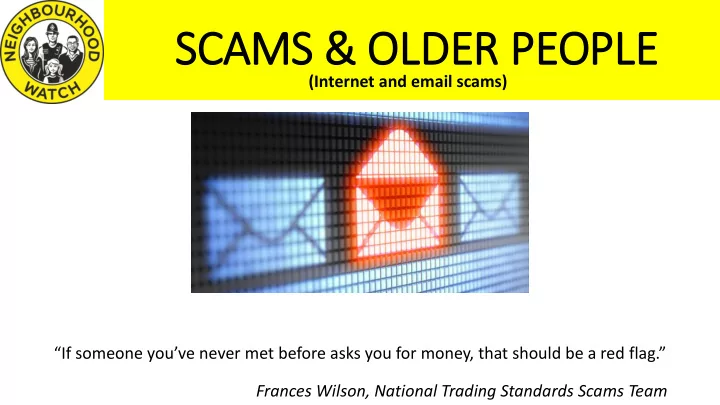

SCAMS & OLDER PEOPLE (Internet and email scams) “If someone you’ve never met before asks you for money, that should be a red flag.” Frances Wilson, National Trading Standards Scams Team
WHAT IS IS A SCAM? Scams are crimes where the perpetrator tries to swindle the victim out of money, or personal information so they can steal their money later. Scam is a slang term for personal fraud. All scams are frauds. Scams can be committed over the phone, through the post, on the internet or face-to- face, often on your doorstep. Once a person falls victim to one con artist, their personal details are often added to so- called ‘suckers lists’ and sold on to other criminals, so they are targeted again and again. £10 billion is lost in the UK each year to scammers.
DON’T BE A VICTIM There are some basic rules that should stop you falling victim to almost any scam. Here they are: • ALWAYS REMEMBER: IF SOMETHING SEEMS TOO GOOD TO BE TRUE, IT USUALLY IS • If you get an offer by email that contains bad spelling or grammar, don’t respond – it’s a scam! • If an email title is odd and the sender is someone who wouldn’t send an “odd” email, then avoid opening it, and definitely do not click on a link in the email • Make sure you use strong passwords on all your online accounts, and change them often • Remember that your bank or building society will never contact you and ask for your PIN number or passwords
EMAIL AND ONLIN INE SCAMS Many scammers use email to target their victims with fraudulent offers or requests for personal information, but this is not the only way that fraudsters operate online. Here are some others: • Fake pop-ups in your online banking window • Retail websites offering fake goods • Links in email or social media messages that, once Action Fraud lists 30 different types clicked on, will infect your computer with a virus or on online fraud. Consumer group malware that deletes or steals your data Which? says 62% of people say they • Providing fraudulent wifi connections in public places have been targeted by online scammers in the last year.
EMAIL AND ONLIN INE SCAMS Terminology Scam Cybercrime Junk email (spam) Vast numbers sent each day Most service providers identify them for you and delete them Most that get through are simply a nuisance Can be hard to block (“from” address is not consistent) Phishing (pronounced “fishing”) Usually false link in the email Adds Malware/Virus Denial of service Malware Worms, Trojan Horse, Spyware, Adware, etc Computer virus Embeds in computer Can corrupt data Records activity and sends details back to criminal Get a good anti-virus package, and keep updated Windows10 better than earlier versions and AppleMac much better than Windows
EMAIL SCAMS Why would I get an email from them? A real example Fake domain (look it up the internet) Why is it not “MGBEngineering.com” say? Looks pukka! Hover over link to see url This company exists
DON’T BE A VICTIM! Follow these back-to-basics rules from Get Safe Online: • Make sure you have strong passwords on all your online accounts. For a secure password, use three random words and include a symbol, numbers and upper and lower-case letters. • Ensure you always have internet security software loaded on computers and update to new versions immediately. • Don’t assume that Wi -Fi hotspots in places like cafes, bars and hotel rooms are secure, so never use them when you’re doing anything confidential online, like banking. Instead, use 3G or 4G. • Never reveal too much personal or financial information in emails, on social networking and dating sites and in person. You never know who might see it or use it.
DON’T BE A VICTIM! • Don’t click on links in emails, posts, tweets or texts – and don’t open attachments – if the source isn’t 100% known and trustworthy • Always access internet banking sites by typing the bank's address into your web browser • Never pay for anything by direct bank transfer unless it’s to someone you know personally and is reputable • Never respond to any emails, text messages, letters or social media that look suspicious
THANK YOU For more information, see https://www.ourwatch.org.uk/crimes- archive/scams-older-people/ THANK YOU FOR LISTENING
Recommend
More recommend